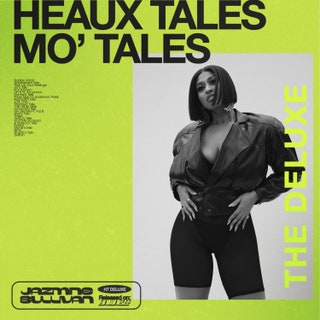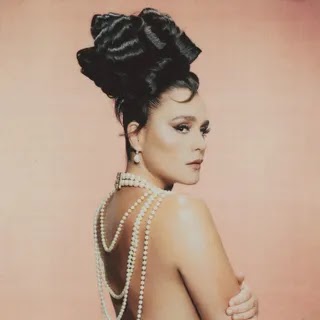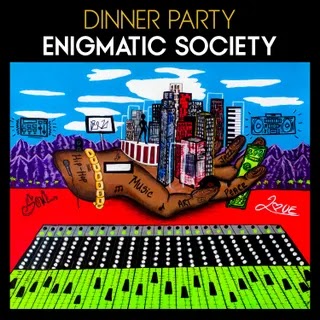On a triumphant deluxe edition of her 2021 opus, the Philadelphia singer lays the groundwork for growth with several new songs and interludes, including an appearance from Issa Rae.
Women deserve everything. On this point, Jazmine Sullivan’s Heaux Tales is unequivocal. Her 2021 mini-opus is a communal emotional audit that pairs nearly every song with a confessional spoken “tale” recorded by a personal friend. With candid intimacy, the Black women interviewed in these snippets revealed hard lessons in love, nuanced vignettes of relationships that thrilled or scarred them. Their perspectives, distinct yet harmonious, cast Sullivan’s music as part of a wider conversation, empowering her to interpret their experiences. Writing about women’s true feelings, in the ways women actually talk about them, Sullivan taps into a creativity and boundless empathy that grants her listeners permission to be equally generous.
Though Sullivan is gifted with a voice that can affect braggadocious confidence as readily as searching anguish, the original Heaux Tales was unassuming: eight songs and six spoken interludes, described in early press materials as a project, and sometimes an EP, rather than an album. Within it, Sullivan and her collaborators drew a picture of lust, heartbreak, betrayal, and insecurity so honest and complete it felt instantly familiar. The new deluxe edition, Heaux Tales, Mo’ Tales, released ahead of Sullivan’s Valentine’s Day tour, extends the story with five additional songs and corresponding tales. We didn’t, strictly speaking, need them—the original album stands alone. But it’s a rare chance to quickly hear a new body of work from Sullivan, who’s typically spaced out her releases (with six years between Heaux Tales and 2015’s Reality Show). Since her mother’s cancer diagnosis last spring, she’s said, time has felt different and “I can’t see myself taking as long as a break anymore.”
Carrying the energy of the original closer, the H.E.R. duet “Girl Like Me,” the new songs adopt a slightly softer sound and more inward focus. They aren’t quite as sharp-elbowed as the original set; they prioritize their characters’ sexual and emotional needs over financial ones, uncovering new strains of hurt and sources of light. Heauxdom, in Sullivan’s telling, was never strictly about money. Except for “Donna’s Tale,” whose narrator observes (as Venus Xtravaganza once did) that even women in conventional marriages exchange sex for security, the album rarely touches on actual sex work. Its characters are empowered by getting money for sex and by giving it, too—“I pay his rent if he nasty,” Sullivan quips on “Put It Down”—but inevitably the field tilts towards the weight of men’s entitlement. Heaux Tales recognizes women’s right to operate with equal impunity, and the debt they’re owed for putting up with poor treatment this long. When Sullivan imagines life as a millionaire’s housewife on “The Other Side,” singing so longingly of her “dreams to buy expensive things,” I hear in her voice the pain of someone who has paid the price emotionally many times already.
Without dialing back or equivocating, Mo’ Tales uncovers new firsthand accounts and starts calling in loans. When these women can’t get good sex, they make it for themselves: “I fuck for sport. I fuck like it’s being taped,” comedian Mona Love says on “Mona’s Tale,” which introduces “BPW,” answering the big-dick sex jams in the album’s first half with a sultry round of applause for the “Best Pussy in the World.” On “Issa’s Tale,” actor and director Issa Rae describes feeling “used” by a selfish sex partner who “pumped me and dumped me” on his way out of town. Her story ends with a gleeful twist: “I’m so glad I was cheating on him.” Sullivan pairs this revelation with her 2021 summer single “Tragic,” a limp-sex lament that riffs on Congresswoman Maxine Waters’ viral procedural challenge to a Trump official (“Reclaiming my time”) to argue for getting off on one’s own. Rae’s story underlines the sentiment with a cheeky new implication: He can’t waste your time if you’re two-timing him.
One of Heaux Tales’ most radical artistic functions is to present vanity and self-interest as a means of balancing a great inequality in the cosmic ledger. In addition to Anderson .Paak as the beleaguered boyfriend on “Price Tags,” Mo’ Tales presents a new male perspective, a more self-aware young man who recalls the moment he finally confessed his feelings to a woman he’d been seeing. “She said, ‘Bro,’” the narrator of “A Breaux’s Tale” says. “When she said ‘bro’ that killed me….Then [she] had the nerve to say she told me she was dealing with other people….She pulled a me on me.” You feel for this dude, getting domed by his own boomerang, but Sullivan follows up with “Roster,” a ballad from girl players to the objects of their affections. “For you, there’s one more slot left in my roster,” she sings, “so don’t catch feelings.” Her bittersweet tone leaves unanswered questions: Did the “bro”-er herself arrive here after past lovers likewise rebuffed her? Could she be denying her own feelings, too? In moments like these, the bonus tracks call out for extra verve and nuance.
The original Heaux Tales ended in loss and resignation, as Sullivan and H.E.R. wondered how else they possibly could have held on to a lover’s wandering attention. Mo’ Tales moves past such immediate concerns and takes a longer look in the mirror. Where do heaux go from here? They demand better for themselves in the first place, Sullivan suggests, and on “Jazzy’s Tale,” she relates her own experience of seeking validation in toxic relationships. The following song, “Hurt Me So Good,” draws its strength and vulnerability from her rafter-shaking vocal power rather than by spilling all the damning details; perhaps she felt less at liberty to embellish on her own story, or perhaps she’s letting go of revenge. She sounds especially raw on the closer, “Selfish,” a drumless, bluesy, demo-like song about learning to be choosey in love. “Lock it up to keep it from/Anyone whose heart is numb,” Sullivan insists, sounding miles away from the opening track, the regrets and humiliations of “piling up bodies.” Every woman could tell a Heaux Tale, but that’s only half the story.
















0 comments:
Post a Comment